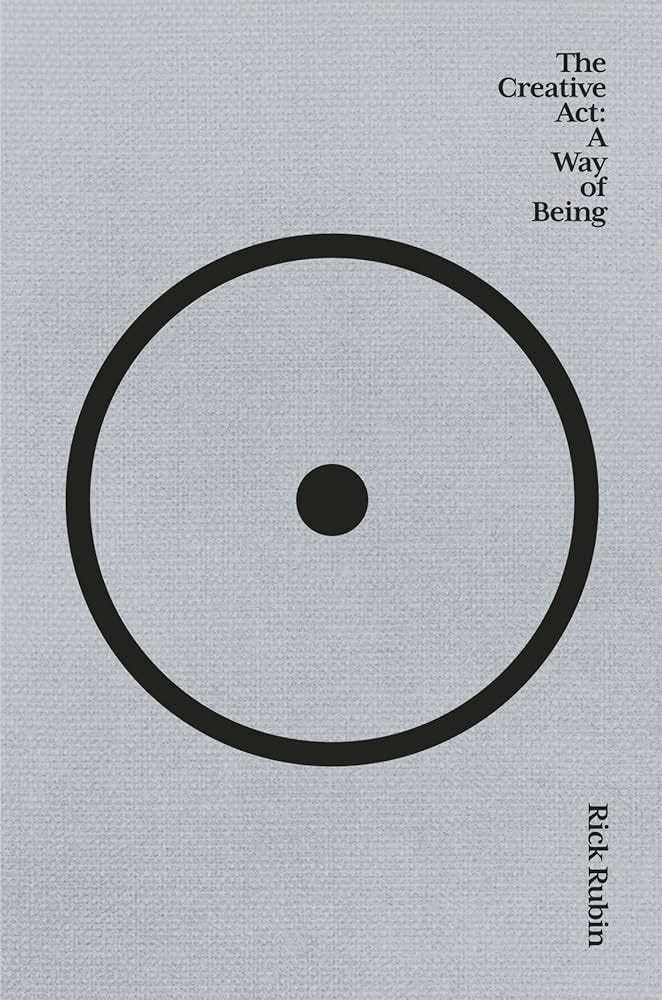Why the Fuck Does Rick Rubin Need a Paid Substack?
Centimillionaire Tells Artists: Don't Make Art for Money (Unless You're Me)
Something guaranteed to make me absolutely furious is when a very successful artist tells other creatives that they shouldn’t want to make art for money. The part that always goes unsaid, though, is that they themselves are clearly special geniuses who do in fact deserve to make a lot of money from their art.
So, when Rick Rubin, centimillionaire music executive, part author of the ghost-written, inscrutable, philosophical, semi-koan, don’t-make-art-for-money-advising creativity book The Creative Act, started a paid Substack, I had some thoughts.
The artist’s goal is to keep themselves pure and unattached… And remember that commercial success is completely out of your control. All that matters is that you are making something you love, to the best of your ability, here and now.
Rick Rubin, the Creative Act
I believe artists should be paid for their work. Substack is an amazing platform for writers to find their value. Rick Rubin deserves to make money from his writing.
I also believe that art doesn’t need to make money to be valuable and that making art is great for us whether we make money from it or not. Both things can be true.
HOWEVER.
Why, the fuck, when you’re worth several hundred million dollars, and you’ve built a platform on art as a high calling that must be separated from commerce, would you paywall your Substack?
It’s hard to pin Rick down on whether he thinks artists deserve to be paid well for their work. He talks a lot about not making art for an audience, about not putting financial pressure on your art, about separating commerce and art. I agree with a lot of that. I think it can be a great relief for artists to take the financial pressure off their art and indeed that art that isn’t sold for money is real art. But when it comes from a music executive, it doesn’t sit well with me.
I don’t want to straw man him. He never says artists don’t deserve to be paid. He consistently implies, though, that artists shouldn’t care about getting paid. And that commerce should be left to the businessmen in suits, not to the real artists.
He never EXPLICITLY says that artists don’t deserve to make money. But his language leaves the door open for gatekeepers to fuck artists. When artists don’t believe money has a role in the process, they don’t know to fight for it.
The danger of Rubin’s wishy-washy philosophical semi-koans is that he can hide behind them. Art becomes a “devotional act”. Which elevates it above material concerns and let’s executives and gatekeepers keep the dirty money.
Coming up with a Story with the purpose of pleasing someone else is a skill set. But it’s more of a commercial endeavour than an artistic endeavour.
Rick Rubin on the Huberman Lab podcast
What’s more, Rick constantly denies the importance of money in the creation of art, all the while making hundreds of millions of dollars from art.
There’s also a conspicuous absence in Rick’s books and interviews of any thought for improving conditions for artists. I’ve never seen him ask for better conditions for musicians in what is objectively a terrible industry. An industry in which he’s an extremely influential voice and has actual, real power.
What incentive could he possibly have for this?
Given he is an executive and producer in that industry, it isn’t hard to see why he might not want other artists to see the value of their work. Then you would have to pay them properly! It’s hard for executives to make hundreds of millions of dollars from artists when they have to… pay them. Rick isn’t willing to work for free, but hopefully you are!
So it’s ironic that Rick Rubin, who thinks that art and commerce don’t really mix, also thinks his Substack should make him money.
We return to the paradox of Rick then. The koans. The questions without answers. The talking around and around.
What possible use could someone worth hundreds of millions of dollars have for a paid Substack? Why not share your wisdom for free, if it’s all about the idea, the art, the joy of creation?
A reasonable yearly return of 5% on Rick’s net worth (assuming a middle estimate of $200 million) would be 10 million dollars. How many Substack subs would Rick need to make a reasonable contribution to his quality of life? To make a million dollars he would need to have 15,384 subscribers on substack at his annual pricing of $65. That’s a lot of money to most people, but not Rick. But hey, the guy has a lot wooden gymnastic rings he needs to nail into the roof of his Malibu mansion, so maybe he needs the money.
The logical explanation is that he believes writing must be compensated in order to be valuable. That art is more worthwhile when it’s behind a paywall.
So what about art and commerce? What about their separation? Is it one rule for me and not for thee? I have made hundreds of millions of dollars for my art, and I will make more through my paywalled writing, but I don’t think you should think you should sully your art by thinking about silly things like audience and commerce. Leave that to me.
So forgive me if I’m skeptical of Rubin’s advice to take considerations of commerce out of art.
Square the dotted circle.





I really appreciate your perspective on this, and I totally understand the frustration, it’s a complex issue. But here’s how I personally see it:
Not all forms of creativity carry the same emotional weight or connection for every artist. For example, I’m an abstract painter, and that part of my creativity feels deeply personal, it’s tied to my identity, almost like a sacred space. I’ve always felt that putting financial pressure on my painting would strip away some of its true essence. It would affect how freely and honestly I can express myself. But I also do photography, and that feels different. I don’t mind monetizing that part of my creativity because it doesn’t carry the same emotional charge. It’s still creative, but in a more flexible, less vulnerable way.
That’s how I interpret Rick Rubin’s situation. Maybe for him, music is the sacred space. He lets the money flow from it naturally but doesn’t chase it. Writing, on the other hand, might be more of a communicative tool, something he’s okay monetizing. And I don’t necessarily think that’s hypocritical.
Also, charging for something like a Substack doesn’t always mean it’s about profit. It can be about boundaries, energy exchange, or curating the kind of audience you want to engage with. Those who really want to engage will stick around, and that creates a different kind of space. Maybe the paywall is more about that than about the money itself.
So yeah, I think it’s possible to both honor your art and also make intentional choices about what you monetize. It’s not black and white.
Thank you for starting this conversation. Big millionaire artists always say "you know what, I do think it's better to have a normal job and have art on the side, so that you don't put pressure on your art to make money, so that you make art for the RIGHT reasons, the real pure reasons" and then you're like... but you made money off your art, a lot actually. Allie Michelle is an example of someone who said this. I love her poetry and everything she does but when she said this on her podcast I got a bit sad like, I guess you think you can strive and expect for your art to make money but other people can't :(